What does QSL mean in AMATEUR RADIO
QSL, an abbreviation in SCIENCE of "Acknowledgement of Reception," is the process used by radio enthusiasts and those with amateur radio operator licenses to confirm a successful two-way communication between stations. This communication can be via voice, Morse code, or digital modes. QSL cards are typically exchanged as a courtesy when confirming these conversations and often include details of the contact such as time, frequency, signal strength, etc.

QSL meaning in Amateur Radio in Academic & Science
QSL mostly used in an acronym Amateur Radio in Category Academic & Science that means Acknowledging of Reception Card
Shorthand: QSL,
Full Form: Acknowledging of Reception Card
For more information of "Acknowledging of Reception Card", see the section below.
What is QSL
The exchange of QSL cards is an integral part of Amateur Radio operations due to its significant role in verifying the success of contacts through a physical record. This verification allows operators from around the world to demonstrate ownership of their call-signs while also allowing others to track their accomplishments if they choose to make them public. Further, QSL cards provide an opportunity for hams to share stories and establish camaraderie with fellow operators regardless of distance. This practice helps to build community among operators while also establishing networks for sharing resources and information.
Purpose
In addition to providing a tangible evidence for successful contact between two-way radios, QSL cards also serve as a way for hams to share memories and create lasting friendships with other operators. The shared memories associated with these exchanges can bring forth nostalgia which reinforces the sense of being connected with distant lands or distant people who may not be accessible through any other means. Furthermore, collecting QSL cards provides a platform for learning more about other cultures and countries as well as helping build relationships between those that otherwise would never meet each other.
Essential Questions and Answers on Acknowledging of Reception Card in "SCIENCE»AMRADIO"
What is an Amateur Radio QSL Card?
An Amateur Radio QSL card is a postcard-like document that is used to acknowledge contact between two Amateur Radio Operators. It serves as a confirmation of radio transmission contacts over long distances and it also provides details such as callsigns and countries involved.
Where can I get Amateur Radio QSL cards?
There are several companies or organizations that offer printing services for QSL cards. For instance, the American Radio Relay League (ARRL) offers a custom printing service for their members. You can also find third-party sites such as qslmaker.com which provide this service for a fee.
How are Amateur Radio QSL Cards Used?
Amateur Radio QSLs are typically used to confirm contacts made with two-way radio communication over long distances. They serve as a record of contact between two operators, providing details such as location, date, time, and callsigns of each operator involved in the conversation.
How do I send a QSL card?
To send a QSL card, you must first get the address of the other operator. Once you have the address, you then need to print out or purchase a blank QSL card, fill in all relevant information such as titles and callsigns for both parties involved in the conversation, and finally mail it off.
Is there any particular format I should follow when filling out my QSL card?
Generally speaking, yes; there are certain fields on the card that should be filled out correctly in order to make sure it is properly processed by your recipient’s mail system. These fields usually include date of contact, frequency/band name, operator's name and call sign, signal strength report (RST), type of transmission (voice/CW/data), location where they were operating from and remarks section.
Are there any etiquette guidelines for sending/receiving amateur radio QSL cards?
Yes; there are certain etiquette guidelines that operators should follow when sending or receiving amateur radios QSL cards. Most notably, operators should always include their postal addresses on the cards being sent or received so they can be returned promptly without issue. Additionally, operators should not demand a reply from another station unless they explicitly ask for one beforehand.
Does it cost anything to send or receive an Amateur Radio qslcard?
Typically no; sending or receiving an amateur radio qslcard does not normally incur any cost beyond whatever postage may be required to deliver it from its sender to its recipient. If both stations agree upon exchanging return postage via mailing envelope along with their respective qslcards then this would involve additional cost but it isn't necessary for normal operation.
Are there any alternatives to using qslcards?
Yes; some operators prefer to use digital methods of confirming long distance contacts rather than relying solely on paper-based media such as qslcards. For instance one popular alternative is eQSL which allows users to exchange digital confirmations with other users without having to wait on physical delivery.
Do I have to wait for my qslcard before acknowledging transmission contact with another station?
No; in most cases verbal acknowledgements are sufficient until your expected receipt of the actual qslcard arrives at your postal address provided by another station during initial contact arrangements.
What happens if my qslcard never arrives at its intended destination due to various postal delays or mishaps?
Unfortunately this situation may occur whereby your expected receipt proves elusive due to unforeseen factors like post office delays etc., In these rare occasions kindly consider re-requesting verbal acknowledgement from other party if possible or alternatively try exploring alternative means like digital confirmation methods mentioned earlier in this FAQ
Final Words:
The tradition of exchanging QSL cards has been embraced by Amateur Radio Operators worldwide for decades and continues today due its significance in providing both evidence and camaraderie amongst operators throughout different regions. By exchanging these cards hams are able to establish networks across countries that help promote knowledge sharing while strengthening the bonds between them all over the world.
